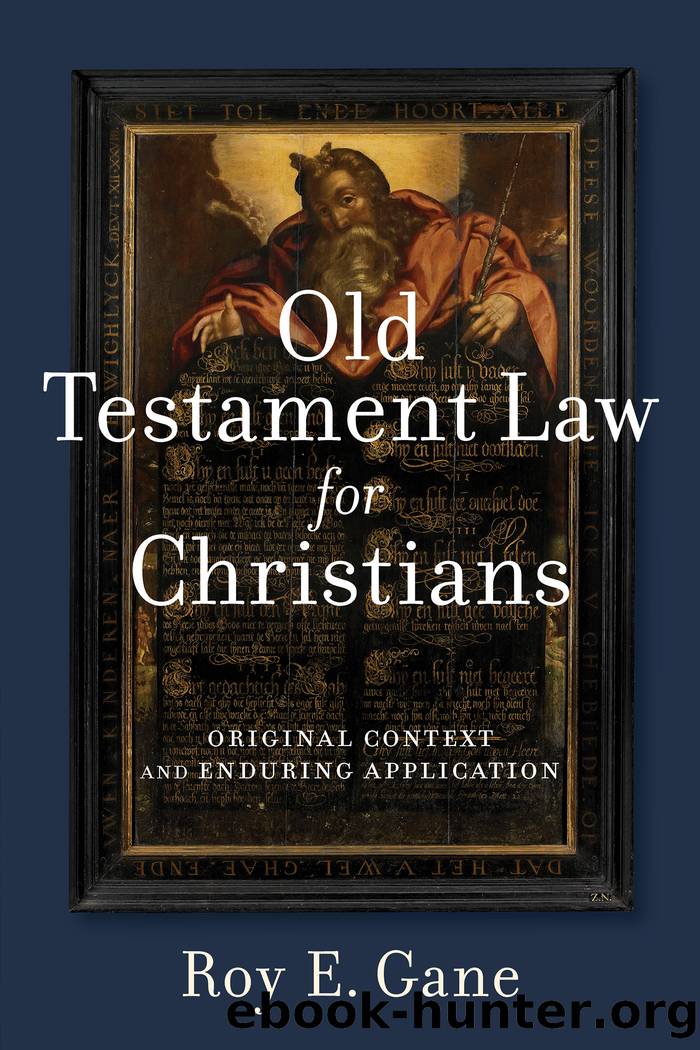Old Testament Law for Christians by Roy E. Gane

Author:Roy E. Gane
Language: eng
Format: epub
Tags: Old Testament;REL006090;REL006630;REL006210;Law (Theology) | Christianity and law
ISBN: 9781493410224
Publisher: Baker Publishing Group
Published: 2017-06-18T16:00:00+00:00
Relate Findings regarding the Function of the Law to Modern Life
1. Does the law, or at least some element of it, directly apply to modern life now, or could it do so in the future? People in some parts of the world today could literally experience the same situation addressed in Exod. 23:4, an enemy’s ox or donkey going astray, or any of the related scenarios in verse 5 or Deut. 22:1–4. This would be highly unlikely for most modern Westerners and probably would be even less likely in the future, but we do keep other kinds of animals, mainly as pets, and occasionally they go astray. On several occasions my wife and I have returned lost animals to their owners, and we have been grateful when neighbors or strangers have reunited our wandering dogs with us. Like ancient or non-Western folk, we can also have enemies, so that complicating factor can continue to test characters.
2. Whether or not a law directly applies today, how does it serve as a paradigmatic example of higher-level values that still apply to analogous modern circumstances? In Exod. 23:4 and Deut. 22:1–2, restoring a straying animal to its owner serves as a paradigmatic example of returning anything belonging to the larger category of lost property, as acknowledged in Deut. 22:3: “And you shall do the same with his donkey or with his garment, or with any lost thing of your brother’s, which he loses and you find; you may not ignore it.” The principle of returning “any lost thing” to your “brother,” which we can understand more broadly as referring to any other person,15 has many more applications today than in ancient times because we have more things to lose (including data in electronic devices) and more ways to lose them.
We also have plenty of ways to help our enemies in addition to returning lost items (including pets). You may not come across “the donkey of one who hates you lying down under its burden” (Exod. 23:5), but you could encounter an individual who has been antagonistic toward you struggling with another kind of vehicle or work instrument, such as a truck, car, computer, or smartphone. If so, you have an opportunity to implement a high-level principle articulated by Jesus: “Love your enemies, do good to those who hate you, bless those who curse you, pray for those who abuse you” (Luke 6:27–28).
3. Does biblical development of the value exemplified by the law show a trajectory that moves beyond the law itself to a higher moral level that should be applied in the modern life situation? As discussed above, Exod. 23:4 and laws related to it could be applied today, whether directly (although rarely) or by close analogy to innumerable other situations that call for helping others, including enemies, with their property. Proverbs 25:21–22 extends the value of helping one’s enemy to situations calling for more intimate and costly assistance, and Rom. 12:17–21 further expands to repaying evil with good at all times. These
Download
This site does not store any files on its server. We only index and link to content provided by other sites. Please contact the content providers to delete copyright contents if any and email us, we'll remove relevant links or contents immediately.
The Aleppo Codex: A True Story of Obsession, Faith, and the Pursuit of an Ancient Bible by Matti Friedman(680)
Tower of Babel by Hodge Bodie(675)
Sarai by Smith Jill Eileen(582)
Zondervan Handbook of Biblical Archaeology: A Book by Book Guide to Archaeological Discoveries Related to the Bible by Price J. Randall & Price J. Randall & House H. Wayne & House H. Wayne(544)
Essential Judaism by George Robinson(525)
Food in Ancient Judah by Shafer-Elliott Cynthia(503)
Christian Faith in the Old Testament: The Bible of the Apostles by Gareth Lee Cockerill(497)
Essential Exposition of the Psalms by Saint Augustine(496)
Becoming the Woman God Wants Me to Be by Donna Partow(466)
On the Book of Psalms: Exploring the Prayers of Ancient Israel by Nahum M. Sarna(422)
A Short Introduction to the Hebrew Bible by John J. Collins(410)
The Beginning of Politics by Halbertal Moshe; Holmes Stephen;(396)
Beginning at Moses: A Guide to Finding Christ in the Old Testament by Michael P. V. Barrett(395)
The Gospel According to Eve by Amanda W. Benckhuysen(390)
Through the Psalms With Derek Prince by Derek Prince(385)
The Life of Moses by Gregory of Nyssa(380)
Abraham by Frances Worthington(365)
Six Themes in Psalms Everyone Should Know by Creach Jerome F. D.;(358)
Creative Word: Canon As a Model for Biblical Education by Walter Brueggemann(357)
